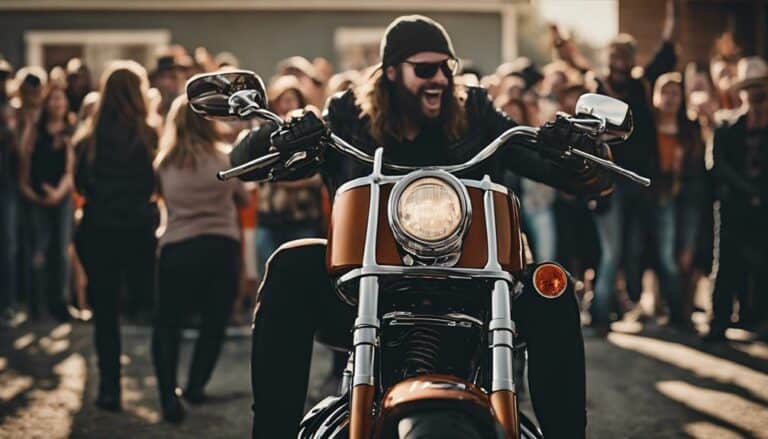You might be wondering who ended up with the coveted Harley-Davidson bike for 2018.
As the year unfolded, enthusiasts eagerly awaited the announcement, with speculation running wild among motorcycle aficionados.
The recipient of this iconic machine would undoubtedly be thrust into the limelight, embraced by the roaring community of Harley riders.
Stay tuned to uncover the thrilling conclusion to this Harley-Davidson saga.
Key Takeaways
- Matt Levatich became President and CEO in 2018, expanding Harley-Davidson's global presence.
- Ownership transition occurred in February 2020 when Levatich stepped down.
- Jochen Zeitz took over on an interim basis in 2020, focusing on strategic reset, profitability, and growth.
- The leadership changes aimed at steering Harley-Davidson towards a path of renewed success and sustainability.
Founding History of Harley-Davidson
Founded in 1903 in Milwaukee, Wisconsin, by William S. Harley, Arthur Davidson, Walter Davidson, and William A. Davidson, Harley-Davidson began its journey in a small shed crafting motorcycles that would later shape American motorcycle culture. The company's founding history is a testament to the spirit of innovation and passion for two-wheeled machines.
From their humble beginnings, the founders of Harley-Davidson set out to create more than just motorcycles; they aimed to create a lifestyle, a sense of freedom on the open road that would become synonymous with the brand.
As the company grew, so did its influence on motorcycle culture, introducing iconic designs that have stood the test of time. Harley-Davidson's impact can be seen in the chopper and cruiser styles that have become hallmarks of American biking. The founders' dedication to quality and craftsmanship laid the foundation for Harley-Davidson to become an enduring icon in the motorcycle industry, embodying the spirit of liberation and adventure.
Key Players in Harley-Davidson Ownership
In the realm of Harley-Davidson ownership, a diverse array of individuals, enthusiasts, collectors, dealerships, and rental companies all played significant roles in acquiring bikes in 2018. This diverse customer base contributed to the cultural influence of Harley-Davidson in various ways:
- Enthusiasts: Motorcycle enthusiasts, including both seasoned riders and newcomers to the biking world, were integral in expanding the community of 2018 Harley-Davidson bike owners.
- Collectors: Those with a passion for collecting motorcycles likely added to the number of Harley-Davidson owners in 2018, valuing the brand's legacy and iconic status in the industry.
- Dealerships: Harley-Davidson dealerships served as key players in facilitating the ownership experience, providing a range of models and services to cater to the diverse needs of customers.
- Rental Companies: Rental companies offering Harley-Davidson bikes allowed individuals to experience the thrill of riding these iconic motorcycles, potentially converting renters into proud owners and enthusiasts of Harley-Davidson bikes.
Evolution of Harley-Davidson Ownership
Amidst the shifting landscape of the motorcycle industry, the evolution of Harley-Davidson ownership has been marked by strategic innovations and global expansions. In 2008, Harley-Davidson commemorated its 105th Anniversary with special edition models, captivating enthusiasts worldwide. The celebration not only honored the company's legacy but also showcased its commitment to excellence. Subsequently, in 2010, the inauguration of the Harley-Davidson Museum in Milwaukee, Wisconsin, provided a comprehensive look into the brand's rich history and the evolution of its iconic motorcycles.
Looking towards the future, in 2017, Harley-Davidson unveiled a forward-thinking plan to launch 100 new motorcycles over the next decade, aiming to engage a new generation of riders and broaden its global reach. This strategic initiative represented a bold step towards securing the brand's relevance in an ever-evolving market. Moreover, in 2019, the partnership forged with Chinese manufacturer Qianjiang to produce small-displacement motorcycles for the Asian market underlined Harley-Davidson's commitment to exploring new horizons and embracing a diverse range of riders. This evolution signifies Harley-Davidson's adaptability and determination to thrive in the face of changing industry dynamics.
Notable Figures Behind Harley-Davidson
Among the key individuals shaping the legacy of Harley-Davidson stands the influential figure of Willie G. Davidson, renowned for his iconic design contributions to the brand.
The Davidson family's deep-rooted connection to Harley-Davidson extends across generations, with Bill Davidson, Willie G. Davidson's son, carrying forward the family tradition as the Vice President of the Harley-Davidson Museum.
At the helm of the company is Matt Levatich, the President and CEO, steering Harley-Davidson through a myriad of strategic endeavors to uphold its esteemed reputation.
Contributing significantly to the marketing and brand development facets of Harley-Davidson is Karen Davidson, another descendant from the founding family, who plays a pivotal role in shaping the company's image and ensuring its continued success.
The combined efforts of these notable figures have been instrumental in shaping Harley-Davidson's rich history and maintaining its position as a leading force in the motorcycle industry.
Ownership Transitions in Harley-Davidson
Shaping the legacy of Harley-Davidson involves understanding the recent leadership shifts that have influenced the company's direction and strategies. In 2018, ownership transitions occurred with Matt Levatich at the helm as President and CEO. Levatich spearheaded initiatives to expand Harley's global presence and ventured into developing electric motorcycles during his tenure.
However, in February 2020, Levatich stepped down from his position, paving the way for Jochen Zeitz to take over on an interim basis. Zeitz, a board member since 2007, brings a wealth of experience in business turnaround and sustainability efforts to the table. His focus is on leading Harley-Davidson through a strategic reset, emphasizing profitability and long-term growth.
As the company navigates these ownership transitions, the rights reserved to Harley-Davidson's legacy are pivotal in shaping its future trajectory under Zeitz's leadership.
Conclusion
You've explored the rich history and evolution of Harley-Davidson, learning about key players and notable figures behind the iconic brand.
From its founding in 1903 to ownership transitions, Harley-Davidson has maintained its status as a legendary name in the motorcycle industry.
Like a roaring engine on the open road, the story of Harley-Davidson continues to captivate and inspire enthusiasts worldwide.

